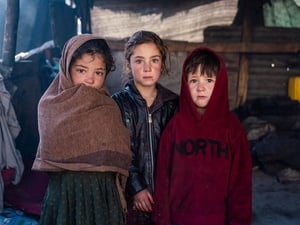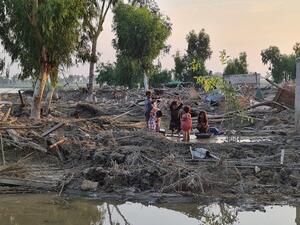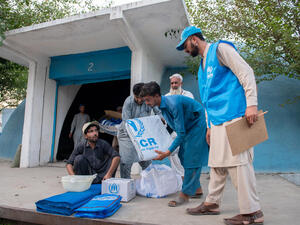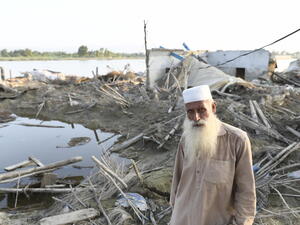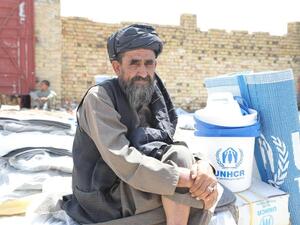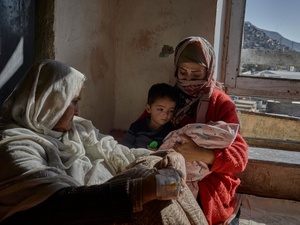UNHCR backs Afghan information mission to Pakistan
UNHCR backs Afghan information mission to Pakistan
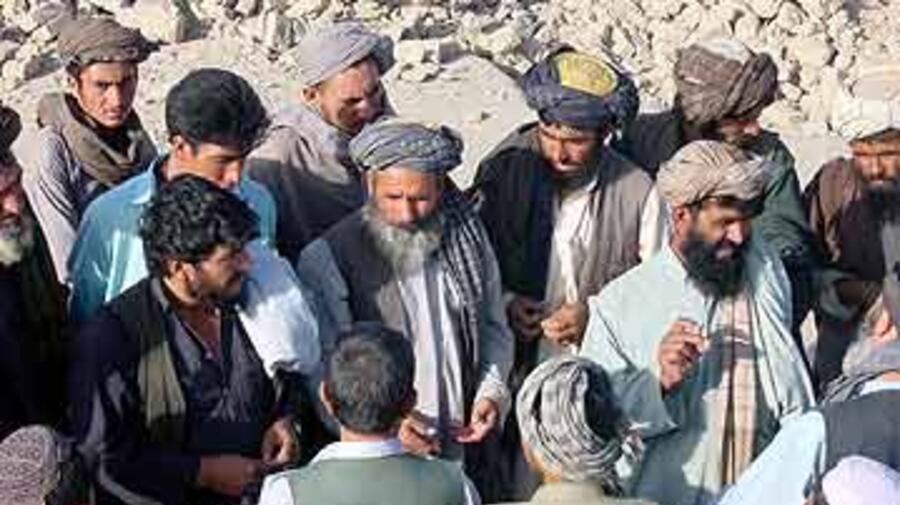
Najam Uddin (centre) representing of the people of Maqqur district in Badghis in a delegation sent to inform Afghan refugees in Pakistan's Balochistan province about conditions back home.
CHAMAN, Pakistan, Sept 29 (UNHCR) - If Afghan refugees are reluctant to go home, then bring home to the refugees.
That was the philosophy at work this month when a delegation from Afghanistan arrived in Pakistan's Balochistan province to seek out refugees who had fled Badghis province and have so far not joined the millions of other Afghans returning home.
"This is a good initiative on behalf of the Afghan government and UNHCR," said Zabi-Ullah, the director of the Rural Rehabilitation and Development Programme in the province located in the far north-west of Afghanistan.
"We know that the problems that built up in Afghanistan through 25 years of war and destruction cannot be solved in a day," he said. "But as a confidence-building measure, this information sharing will help Afghan refugees to understand what the government is doing in their home areas with the help of other countries and international aid agencies."
The team from the Badghis Return Task Force contained representatives of the Afghan government, the provincial administration and members of the public. The UN refugee agency encouraged and facilitated the project but did not have a representative in the delegation, preferring that refugees hear directly from their countrymen.
The visit, targeted at refugees in Balochistan, followed one earlier this year to Iran by a team from Afghanistan's Bamyan province. A more extensive visit to refugees in Pakistan by a team from the Return Commission Working Group is planned for later this year.
"The refugees that we met were eager to hear about the latest happenings in their province, and whatever information we had, we shared with them," said Abdul Hameed, Director of Repatriation and Rehabilitation in Badghis. "We told them that things are moving in a positive direction and, God willing, Afghanistan will soon be back on its feet."
However, the delegation conceded that some of the refugees' concerns were legitimate and it would take time before they felt confident to return to their original homes. Difficult issues include land distribution that the Afghan government is not yet ready to address and the future livelihood of Kuchis, the nomadic Afghan population that has seen its traditional way of life destroyed by continuing drought.
UNHCR has conducted extensive information campaigns since the start of the voluntary repatriation programme in March 2002 to ensure that the millions of Afghan refugees in Pakistan and Iran know about conditions in their homeland. A network of UNHCR staff in Afghanistan compiles data that is distributed by UNHCR staff in the neighbouring countries, both in writing and through radio broadcasts.
But there is nothing better than first-hand information. UNHCR has been regularly assisting delegations of refugees to visit Afghanistan to see conditions for themselves and now is encouraging the visits by Afghans to the refugees in the host countries.
The Afghan team arrived as UNHCR was in the process of closing the four "new" camps at Chaman that had been set up on the border to house refugees from the 2001 war in Afghanistan. Many refugees originally from Badghis in those camps had already dispersed to "old" camps elsewhere in Balochistan, where UNHCR is continuing education, health, water and sanitation assistance. Others had repatriated, but mainly to Helmand province in the south rather than to their original homes.
"As the representative of the local people of my district, I told our brothers that they were welcome to repatriate whenever they intend to," said Najam Uddin, who came on behalf of the people of Maqqur district in Badghis. "Things are gradually returning to normal but we also agreed with them that everything that they expect to be in perfect condition is not there."
"However, even then there have been Afghan refugees returning to the area, so if they come we will welcome them open-heartedly," he said.
UNHCR offers assistance to any Afghan in Pakistan or Iran wishing to return under a voluntary repatriation programme that runs until March 2006 in Pakistan. So far, of the 2.26 million Afghans UNHCR has assisted to leave Pakistan, 4,368 were from distant Badghis. A further 3,125 Badghis residents were among the more than one million Afghans to go home from Iran since 2002.
By Jack Redden
UNHCR Pakistan


